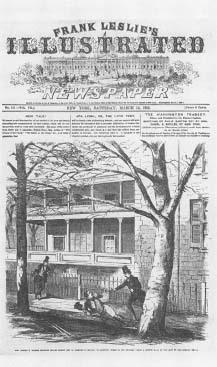Daniel Sickles Trial: 1859
Lafayefte Park Killing
By the time Sickles was tipped off by an anonymous letter, dated February 24, 1859, the relationship between Teresa Sickles and Key was certainly the primary topic of conversation in the family's servant quarters and had started tongues wagging in Washington society. Confronting his wife with the evidence that he and a close friend collected, Dan Sickles extracted a detailed written confession from her and then, in state of near hysteria, called two of his political cronies to his home to ask for their advice.
 Congressman Daniel Sickles' promising political future was doomed after he shot his friend Barton Key.
Congressman Daniel Sickles' promising political future was doomed after he shot his friend Barton Key.
Meanwhile, upset because he had not heard from Teresa Sickles for several days, Key rented a front room in the Cosmos Club across Lafayette Park from the Sickles home. From there, peering through his opera glasses, he tried to spot a signal from Mrs. Sickles. Impatient and unaware that her husband knew all, Key twice passed in front of the Sickles' home on February 27, brazenly signaling Teresa Sickles with his white pocket handkerchief.
At home and pacing the floor, Dan Sickles abruptly stopped, looked out a front window, and cried out, "That villain is out there now making signs." One of the advisors consoling him, the Tammany politician Samuel F. Butterworth, agreed to go across the park to check whether Key had a room at the club. A few moments later, Butterworth recollected, Sickles stormed out of the house, whereupon he saw Key mingling with the Sunday afternoon strollers promenading around Lafayette Park.
Pounding up to Key, Sickles raged, "Key, you scoundrel, you have dishonored my house—you must die!"
Sickles pulled out a pistol and fired. The two men grappled momentarily before Sickles pulled himself away and fired again. Hurling his opera glasses at his attacker, the wounded Key ducked behind a tree where Sickles' next bullet lodged. Ignoring Key's cries for mercy, Sickles shot again and Key staggered and fell into the gutter. Standing over Key, Sickles aimed at his head, but the gun misfired. Finally, a passerby became involved, pinning Sickles' arms and subduing him.
While Key was dying inside the club, Sickles took a carriage to the home of Attorney General Jeremiah S. Black and surrendered.
Additional topics
Law Library - American Law and Legal InformationNotable Trials and Court Cases - 1833 to 1882Daniel Sickles Trial: 1859 - Lafayefte Park Killing, Mobilizing The Defense, Cold-blooded Murder Or Justifiable Homicide?, Public Opinion Turns Against Sickles